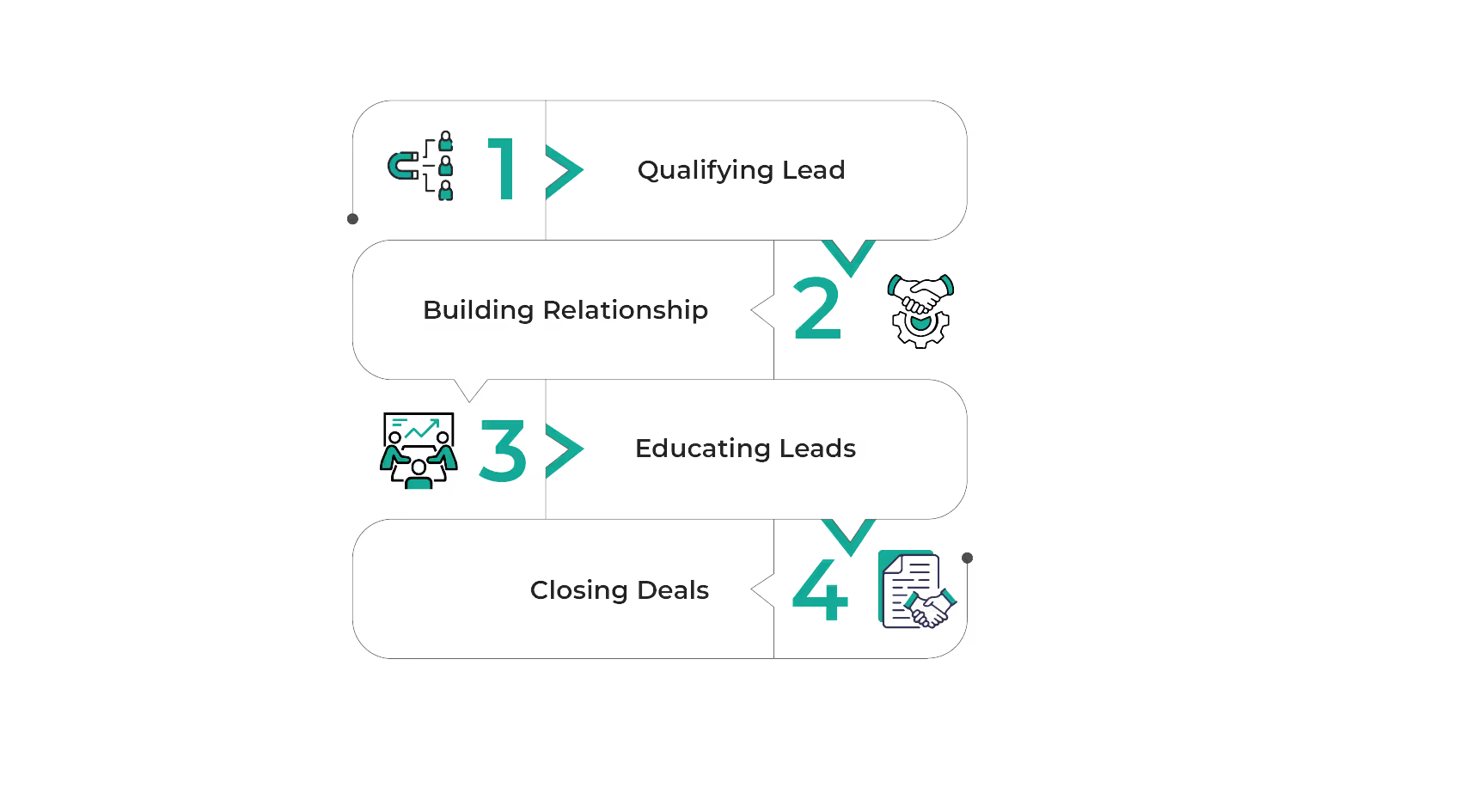
Blog
Sales Team Structure: Four Most Common Roles and Responsibilities
March 27, 2023


Key Insights
Preface:
It goes without saying that sales teams are the pivot of your business!
They are out there in the trenches bringing customers in and closing deals for you. To state the obvious, an effective sales team can help drive revenue growth by generating leads, nurturing prospects, and converting them into paying customers. They can also upsell and cross-sell to existing customers. When it comes to generating leads, it's crucial to understand the different types of sales leads, including cold leads, warm leads, and hot leads, to tailor their approach and maximize conversion rates.
The composition of a sales team may vary depending on the organization's size and type. For instance, a small business might have only a few sales reps, while a large corporation might have a much larger sales team with specialized roles such as sales executives and sales specialists.
Motivating sales teams can take various forms, as they come in different sizes and structures. However, their overarching goal remains constant: to generate revenue and fuel the growth of the business.
In this article, we’ve compiled a list of some of the most common sales team roles and responsibilities.
Introduction:
When examining a large company with multiple representatives across diverse sales teams and a small business where one or two individuals handle all sales-related tasks, notable differences emerge. In the context of the small business, these individuals, often the founders or owners, have a deep understanding of the products or services they offer. Sales coaching recognizes this intimate knowledge and expertise, highlighting the unique advantage these individuals possess in effectively selling their offerings. The approach of sales planning of the company plays a vital role in highlighting these evident differences.
However, you may ask: what are the similarities?
Well, the fact of the matter is that selling has changed significantly over the years! For both large and small businesses. What this means is that this dynamic sales ecosystem has brought everyone on a level playing ground, wherein both have had to redefine sales ‘best-practices’.
The lone-wolf salesman swooping in to heroically close an impossible deal? We would be lying if we say we don’t particularly love this trope. However, the idea of a single rep handling a sale- even a simple sale- is long gone. With more and more stakeholders getting involved in a single sale, selling is now a team effort.
More often than not, defining sales roles is extremely simple in the beginning. But, companies grow! More people are hired. Some of them will be hired for the same role. Before you know it, you are staring at this large daunting pyramid of hierarchies: regional sales managers, sales managers, channel managers, SDRs and so on.
This is just the beginning. Adding new reps to keep up with growth also means restructuring your sales model everytime a rep joins the team.
Needless to say, clearly defining sales roles and responsibilities, along with integrating effective sales process steps, takes on new urgency in this ever-changing business ecosystem. Let us help you tap into the latest insights about some of the most common sales team roles and responsibilities, along with a valuable playbook sample, addressing the crucial balance of sales efficiency vs effectiveness for sustainable growth.

What is a sales team?
A sales team is a group of individuals within an organization who are responsible for selling the company's products or services to customers. The primary goal of a sales team is to generate revenue by persuading potential clients or customers to make a purchase.
Sales teams play a crucial role in the overall success of a business, as they directly contribute to the company's financial growth.
The structure and composition of a sales team can vary depending on the size and industry of the company. Effective communication, collaboration, and a clear understanding of the products or services being sold are essential for the success of a sales team.
What are the roles and responsibilities of sales team members?
In a sales team, each role serves a specific function, contributing to the overall sales process. Let's explore the various sales team members, their roles and responsibilities.
Sales Manager
Sales managers oversee and lead the sales team. They set sales targets, develop sales strategies, and ensure that the team meets its objectives. Sales managers are also responsible for coaching and mentoring sales representatives, monitoring performance, and implementing training programs.
Account Executives
Account executives focus on managing relationships with existing clients. They work to understand the client's needs, provide solutions, and ensure client satisfaction. Account executives may also explore opportunities for upselling or cross-selling additional products or services.
Sales Development Representatives
SDRs focus on outbound prospecting to generate leads for the sales team. They may engage in cold calling, email outreach, and other methods to identify potential customers, qualify leads, and schedule appointments or meetings for sales executives.
Sales Support
Sales support roles provide administrative assistance and operational support to the sales team. This may include managing sales data, preparing reports, handling paperwork, and ensuring that sales processes run smoothly. Sales support may also involve coordination with other departments, such as marketing or customer service.
The various sales roles collectively form a well-rounded team, with each member contributing to different aspects of the sales cycle.
Sales Manager:
Essentially, the role of a sales manager is to supervise and lead a team of sales representatives, guiding them towards achieving their on target earnings and specific sales targets and goals.
Some of the primary responsibilities include:
- Setting sales targets for the team based on the company's overall goals and objectives
- Developing sales strategies that will help achieve sales targets
- Monitoring sales performance to identify areas where the team can improve and areas where they are excelling
- Coaching and training team members to improve their sales skills and performance
- Motivating the team to achieve their targets by recognizing and rewarding their achievements
- Analyzing market trends and changes in the industry to adjust their sales strategies accordingly
- Reporting to senior management and provide recommendations for improving sales processes and strategies
Inbound Sales Representative:
Inbound sales are critical to the sales process. Their main responsibility is to convert inbound leads into customers by effectively communicating the value of the company's products or services and addressing any concerns or questions that the lead may have. This involves not only qualifying leads and building relationships but also engaging in direct sales recruiting activities to identify and bring in new talents who can contribute to the team's success.
Some key tasks and responsibilities of inbound sales reps include:

Qualifying leads:
- This includes assessing whether an inbound lead is a good fit for the company's products or services
- Asking the right questions to understand the lead's needs and determine whether the company's offerings can meet those needs
Building relationships:
- Inbound sales reps are expected to build a rapport with leads to establish trust and credibility
- This involves actively listening to the lead's concerns and providing personalized solutions
Educating leads:
- It is imperative for inbound sales reps be knowledgeable about the company's products or services and able to clearly articulate their benefits
- They also need to educate leads on how the company's offerings can solve their problems and address their pain points
Closing deals:
- Ultimately, the goal of inbound sales reps is to close deals with qualified leads
- This involves understanding the lead's buying process, negotiating terms, and making sure that the customer follows through.
Outbound Sales Representative:
The role of an outbound sales representative typically involves actively reaching out to potential customers to generate interest in a product or service and ultimately close a sale.
Some specific responsibilities may include:

- Identifying potential customers or markets that may be interested in the product or service being offered
- Contacting potential customers via phone, email, or other communication channels to introduce them to the product or service
- Identifying and addressing any objections or concerns the potential customer may have about the product
- Working with the customer to understand their needs and how the product or service can meet those needs
- Negotiating terms and closing sales
- Building and maintaining relationships with customers

Sales Operations:
Sales operations play a critical role in driving the success of a sales organization by supporting and optimizing the sales process. This includes streamlining sales workflows, and automating sales processes using a sales commission tool.
Conduct a thorough salesforce evaluation process. Read What Is Sales Performance Evaluation and Why It Matters?
Some of the specific roles and responsibilities of sales operations include:
- Sales ops professionals work to identify and remove any bottlenecks in the sales process, including streamlining sales workflows, automating sales processes, and managing sdr compensation plan templates.
- Data management and analysis: Sales operations teams are responsible for collecting, analyzing, and presenting data on sales performance. This data can be used to identify trends and insights that can be used to improve the sales process and make more informed business decisions
- For some companies, sales operations professionals may also be responsible for developing and implementing sales training programs to help sales reps improve their skills and performance
- Sales ops are often responsible for managing CRM systems, sales automation tools, and other sales-related software
- They are tasked with using historical data and trends to forecast future sales performance, helping the organization to plan and allocate resources accordingly
To learn more about sales, check out the Advantages and Disadvantages of Sales Concepts.
Importance of Sales Team
The sales team is the backbone of any business. They're the ones out there building relationships, understanding customer needs, and ultimately driving revenue. Without a strong sales team, even the best products or services can struggle to find their way into the hands of customers. It’s all about making those connections and turning interest into action.

#1 Business Development
When it comes to business development, the sales team plays a crucial role in expanding your company's reach. They're constantly on the lookout for new opportunities, whether it's breaking into new markets, forming strategic partnerships, or simply bringing in fresh leads. Their work is what keeps the pipeline full and the business growing.
#2 Conversion Rate of Sales Leads
The sales team is also key to converting leads into actual sales. It’s not just about getting a foot in the door; it’s about turning that initial interest into a deal. By understanding the customer’s needs and effectively communicating the value of your product or service, the sales team can significantly boost the conversion rate, making every lead count.
#3 Retention of Customers
Finally, let’s not forget about customer retention. A great sales team doesn’t just close deals and move on; they build lasting relationships. By staying connected with customers, addressing their ongoing needs, and ensuring they’re satisfied, the sales team helps turn one-time buyers into loyal, long-term customers. This focus on retention is what drives sustained business success.
Strategic Compensation for Different Sales Team Roles
The following compensation strategies are general guidelines and may vary based on factors such as the product, industry, and company goals.

The Account Executive
Compensation combines a base salary with substantial commissions based on deals closed, motivating them to drive revenue.
Sales Development Rep
Their pay includes a solid base salary plus bonuses for generating leads and booking meetings, incentivizing proactive prospecting.
Sales Specialist/Sales Consultant
Compensation features a competitive base salary with incentives for customer satisfaction and upselling, rewarding their expertise.
Customer Success Rep
Their plan includes a base salary and bonuses tied to customer retention and satisfaction, encouraging strong relationships.
The Sales Manager
Compensation consists of a base salary with bonuses based on team performance and individual development, motivating effective leadership.
To Conclude:
Building a good sales team is essential for the success of any business. A well-functioning sales team, armed with various types of sales collateral, helps to generate revenue, build customer relationships, identify new opportunities, and provide valuable feedback.
Moreover, the sales team is in constant communication with customers which means that they can provide valuable feedback on the company's products or services. This feedback can then be used to improve the quality of the products or services, and to develop new products that better meet the needs of customers.
As you build your sales team, it is important to remember that clearly defining job responsibilities between sales representative vs sales associate and optimizing the allocation of sales resources is as important as recruiting good people. By having clearly defined roles, everyone on the team knows what is expected of them, and larger company goals can be achieved.
ReKennect : Stay ahead of the curve!
Subscribe to our bi-weekly newsletter packed with latest trends and insights on incentives.
Thank you! Your submission has been received!
Oops! Something went wrong while submitting the form.
Your data is in safe hands. Check out our Privacy policy for more info













